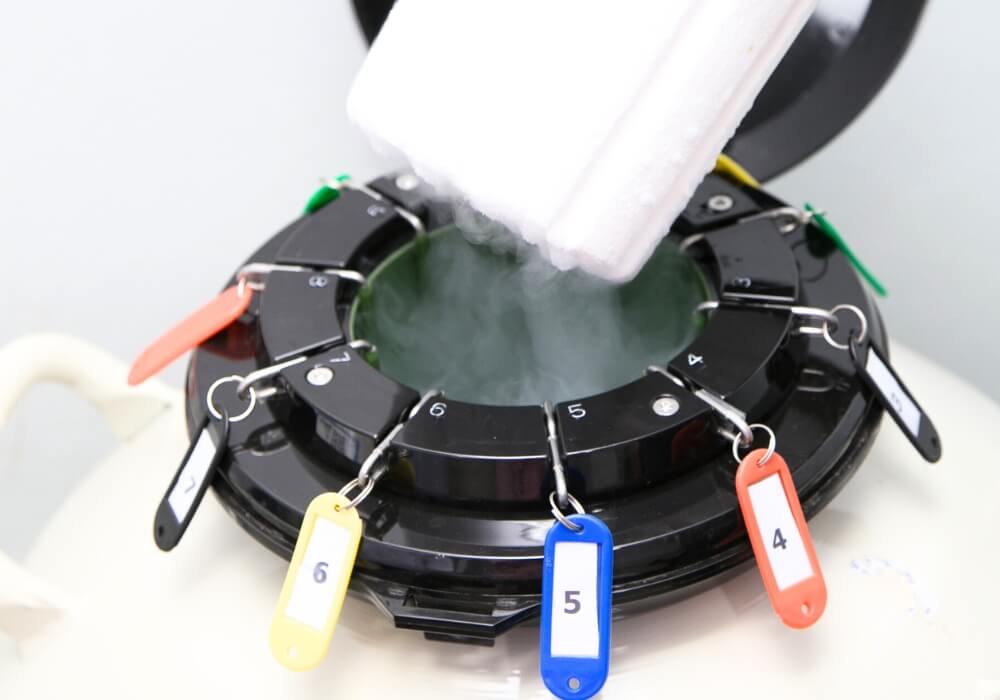Egg freezing, scientifically known as oocyte cryopreservation, is a remarkable advancement in reproductive technology. It empowers individuals to preserve their fertility for future use, offering a sense of control over their reproductive journey. In this overview, we’ll explore the ins and outs of egg freezing, including who might benefit from it, the intricacies of the process, potential costs, and the psychological aspects to consider.
Understanding Egg Freezing
Egg freezing involves stimulating the ovaries with hormonal medications to promote the development of multiple follicles, the same process that occurs in IVF. Once the follicles mature, eggs are retrieved vaginally with ultrasound assistance through a minimally invasive surgical procedure under light sedation or general anaesthetic. The procedure itself takes around 20 minutes. These eggs are then carefully preserved using liquid nitrogen, maintaining their viability for future use.
Who Might Consider Egg Freezing?
Various individuals may find egg freezing to be a valuable option:
- Fertility Preservation: Those facing medical treatments for cancer such as chemotherapy that could jeopardise future fertility.
- Age-related Fertility Concerns: Women wishing to delay childbearing due to personal or professional reasons.
- Transgender Individuals: Before gender-affirming surgery or hormone therapy.
- Genetic Disorders or Health Conditions: Those with conditions affecting ovarian function.
- Endometriosis or Ovarian Masses: Women with conditions impacting reproductive health.
The Egg Freezing Process
Egg freezing serves as the initial step in the IVF journey. Once eggs are retrieved and preserved, they can be fertilised with sperm to create embryos when the individual is ready to start building a family. It’s essential to recognise that while egg freezing is promising, it introduces individuals to the complexities of the IVF process.
Understanding the Numbers
The number of eggs needed for egg freezing success varies depending on factors such as age and medical history. Achieving a statistically favourable outcome often requires multiple cycles of ovarian stimulation. For instance, women aged 38-40 may aim to preserve 25-30 eggs to attain a 65-75% live birth rate. However, it’s important to note that no number guarantees a future pregnancy.
Egg freezing isn’t an insurance policy with guaranteed results; rather, it’s a numbers game with potential challenges at every stage:
- Poor response to medication or early ovulation can lead to cycle cancellation.
- Not all collected eggs may mature or survive the freezing process.
- Upon future use, eggs may not fertilise, may not develop into viable embryos, or may not result in successful implantation and pregnancy.
Transparent discussions with your care team regarding expectations and potential hurdles are essential. Additionally, understanding the financial costs, including treatment, tests, medications, procedures, and storage fees, is crucial.
The psychological impact of egg freezing is significant. Take the time to explore your options thoroughly and ensure you feel supported and confident in your decisions. By being well-informed and prepared, you can navigate the egg freezing journey with clarity and peace of mind.
Optimising Your Journey
While uncertainties exist, proactive measures can improve your chances of success. Seeking advice on nutrition and supplements to optimise egg quality is important. Maintaining a healthy lifestyle, including regular exercise, quality sleep, and minimising alcohol intake, can further support your egg freezing journey. Consider complementary therapies like acupuncture for additional support.
Building a strong support network is essential. Ensure you feel confident in your team of healthcare providers. Engage in conversations with the embryology team to gain insight into the laboratory processes and the expertise behind them. Understanding the intricacies of the lab from the perspective of the experts can provide valuable clarity and confidence as you embark on your egg freezing journey.
Conclusion
Egg freezing represents a significant advancement in reproductive medicine, offering individuals the opportunity to seize control of their fertility. While it’s not without challenges, understanding the process, considering all aspects, and seeking support can pave the way for an empowered and informed decision-making process.
Reference:
Goldman RH et al (2017) Predicting the likelihood of live birth for elective oocyte cryopreservation: a counselling tool for physicians and patients. PMID: 28166330

